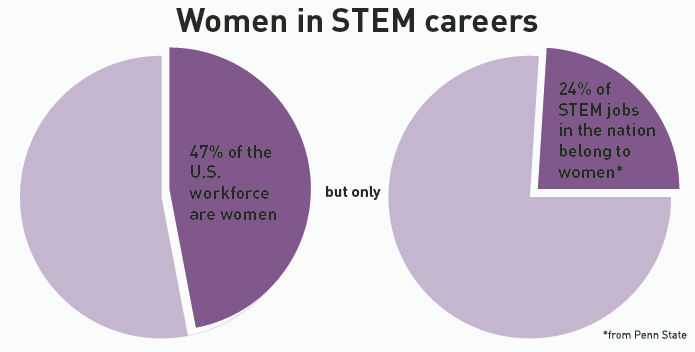Women in science and engineering find their communities at Iowa State
October 8, 2019
Iowa State’s College of Engineering consists of 1,296 females and 6,592 males, according to the Iowa State Department of Institutional Research. Needless to say, being a woman in the College of Engineering on campus is a relatively unique experience.
Caroline Crisp, a sophomore in mechanical engineering, described her first experience with Iowa State’s engineering program.
“When I came to Iowa State I went on the Iowa State College of Engineering tour,” Crisp said. “It just felt like home.”
When starting as a freshman, Crisp found support from Iowa State as she navigated a male-dominated major. She became involved in Women in Science and Engineering (WiSE), a program designed to benefit women pursuing science, technology, engineering and math (STEM) majors.
“They try to plug you into all their different networks where you’ll feel supported […] it’s great to know that you have other people you can use as resources,” Crisp said.
WiSE has a multitude of different programs, including one that establishes learning communities and another that has community outreach activities. According to Iowa State’s learning community website, the learning community initiative “seeks to enhance our undergraduates’ experience by providing all interested students dynamic, focused communities in which students, staff, and faculty can learn and grow together.”
Crisp spoke about some of the people she has come to know through her learning community.
“I met them through my mechanical engineering learning community my freshman year […] they did a really good job of sectioning certain sections where there were a lot of mechanical engineering girls,” Crisp said. “I’m still really good friends with them today.”
Community and support systems are key to finding success for any college student. Haley Primrose, a sophomore in computer engineering, found her community through Electrical Computer Software Engineers as Leaders (ECSEL) at Iowa State. This community helped Primrose as she faced the challenges of being a computer engineering student.
“Just being able to be supported by 18 girls around me just constantly being like, ‘yeah you’ve got this,’” Primrose said about why she likes being in ECSEL.
Melanie Fuhrmann, a senior in computer engineering, knew her major was smaller than others. She was one of only 17 women enrolled in computer engineering last fall. She shared why she thought there was such a small amount of women in engineering.
“I think it’s partially society,” Fuhrmann said. “Just when you see an engineer you automatically think a man, so I don’t think many women see themselves in that kind of position, but it’s a shame.”
Each of these women have found their own ways to navigate through the challenges that come with being an engineer.
“Understand that if you ever feel that you’re alone with a problem or you feel like you’re not good enough for it, know that every other person that’s ever done that major has felt the same way at some point or another and they’ve overcome it, so you can too,” Fuhrmann said.
Crisp shared a similar sentiment.
“I found persisting through it, putting in the work, making sure you understand the material […] is how you’ll really ‘flourish,’” Crisp said.
WiSe is a program women in the science and engineering field at Iowa State can use to flourish. Carly Miller, the undergraduate program coordinator for WiSE, commented on the intentions WiSE holds as a program. She said it’s important to recognize WiSE students have various identities beyond identifying as female, with the identities ranging from privilege to marginalization.
Miller said that it’s important to realize all students experience their STEM environments differently.
“Our students demand different types of support and action from our office to support their retention, sense-making and success in accomplishing their goals,” Miller said. “In order to accomplish our mission, it is imperative for our staff, students and associated faculty to understand their own identities and work toward making STEM fields more inclusive for all.”
WiSE provides a space for people to make sense of their major and career paths. Miller said it is crucial for Iowa State’s campus and corporate partners to be a part of this conversation and the pipeline for students.
“This work includes having conversations about diversity and equity with the corporations that our students find research, internships and job opportunities within, and providing students opportunities to experience corporate cultures in STEM and network with corporate leaders, especially female leaders,” Miller said.
While WiSE provides a place to discuss plans of diversity and equity, it is also a place to do so much more. Miller says WiSE is a place for students to relax, hang out or study, but it also is a place for students to find tools to succeed.
“We provide academic success and professional development support through a tutoring program, strengths workshop, our academic planner and opportunities to network with female leaders in STEM fields and at the university,” Miller said.
As WiSE looks to the future, it hopes to see more diversity not only in the science and engineering departments at Iowa State, but on a global scale.
“It is our hope that we would then see an increase in the representation of diverse women in STEM fields and in positions of leadership within,” Miller said. “An outcome of our work is also cultural, through dialogues about equity and diversity with campus and corporate partners. We hope to see Iowa State and STEM fields continue to develop welcoming and inclusive cultures for diverse student and employee identities.”

















